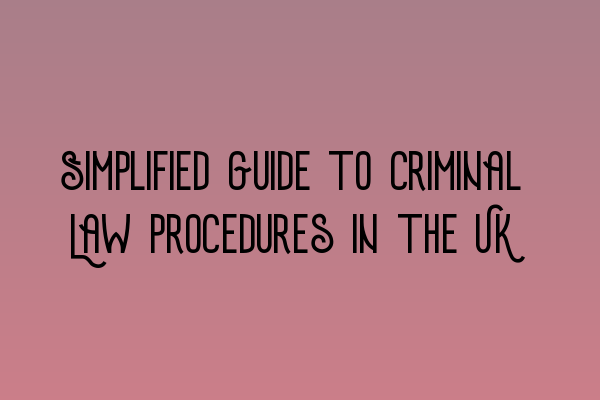Simplified Guide to Criminal Law Procedures in the UK
Welcome to SQE Criminal Law & Practice Law UK, where we aim to provide you with a simplified guide to criminal law procedures in the UK. Whether you are a law student preparing for the SQE exams or a professional in the legal field, understanding the criminal law procedures is essential.
1. Overview of Criminal Law Procedures
Criminal law procedures form the backbone of the criminal justice system in the UK. It encompasses the entire process from the initial investigation to the trial and sentencing. It is crucial to have a clear understanding of these procedures to navigate the legal system effectively.
Before we delve into the details, if you are preparing for the SQE exams, make sure to check out our SQE 1 Practice Exam Questions and SQE 1 Practice Mocks FLK1 FLK2 for comprehensive preparation.
2. Initial Investigation
The criminal law procedure begins with the initial investigation conducted by law enforcement agencies. This phase involves gathering evidence, interviewing witnesses, and identifying potential suspects. The investigators must follow strict protocols to ensure the legality and integrity of the evidence.
3. Arrest and Charging
If there is sufficient evidence, the police may arrest a suspect. The arrested individual is informed of their rights and taken into police custody. After the arrest, the police have the power to charge the suspect with a criminal offense. It is important to note that a person is considered innocent until proven guilty in a court of law.
4. Pre-trial Proceedings and Plea Bargaining
Once the suspect is charged, the case proceeds to pre-trial proceedings. This stage involves various legal formalities, such as bail applications, case management hearings, and disclosure of evidence. It is during this phase that plea bargaining may occur, where the prosecution and defense negotiate a plea agreement.
If you want to enhance your understanding of criminal law procedures for the SQE exams, check out our comprehensive SQE 2 Preparation Courses.
5. Trial and Sentencing
If the case proceeds to trial, it is heard before a judge and a jury (in some cases). The prosecution presents their case, and the defense has the opportunity to provide their arguments and counter-evidence. At the conclusion of the trial, the judge or jury determines the guilt or innocence of the accused. If found guilty, the judge proceeds to sentencing, taking into account various factors, such as the severity of the crime and the defendant’s previous criminal record.
Conclusion
Understanding the criminal law procedures in the UK is essential for anyone involved in the legal profession. Whether you are preparing for the SQE exams or seeking to enhance your legal knowledge, SQE Criminal Law & Practice Law UK provides invaluable resources and courses. Make sure to check out our SQE 1 Preparation Courses and stay updated with the latest SRA SQE Exam Dates.
